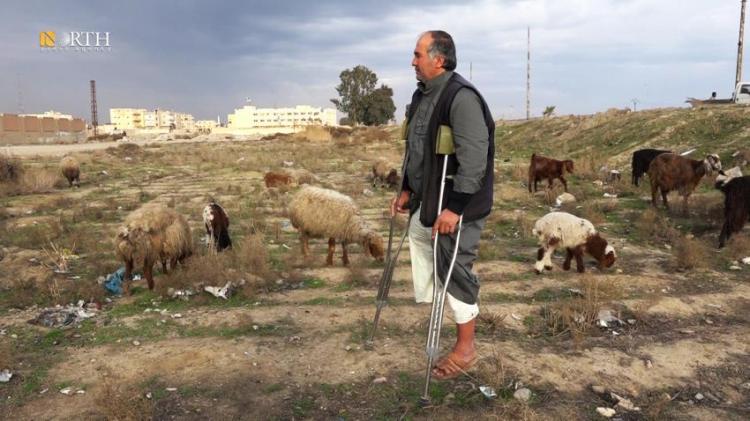Raqqa – North-Press Agency
Mostafa al-Khalil
The suffering of the amputees as a result of the mine explosions in Raqqa goes on even after the defeat of the Islamic State group (ISIS) in the fall of 2017, as mines formed a source of panic for the fleeing residents during the battles or for the people returning to their homes afterwards, some still talk about stories which are closer to fiction, where some of them find a mine planted in the toilet, and another who died by a ‘carefully planted mine’ at the entrance of his house.
The young Abdullah al-Ali believed that his departure from the city of Raqqa in early April 2017 would avoid the scourge of the battles which began to be intensified in his city, turning it into a "ghost city, he wasn't thinking about the dangers of the road that was waiting for the Syrian refugees and the displaced wherever they went.
In 2017, the city of Raqqa witnessed fierce battles between the Syrian Democratic Forces (SDF) backed by the Global Coalition and ISIS terrorist group, killing about 3,250 people, including 1,130 civilians, 270 children at least, according to Syrian Observatory for Human Rights.
On that day, al-Ali walked with his brothers and cousins taking the road to the village of al-Marouda, 17 km northeastern Raqqa, to be surprised by a landmine explosion, which was planted on the road and passed by the small truck which was carrying them.
Al-Ali lost one of his brothers and his cousin, and his younger brother was injured, he lost his right foot making him to suffer Permanently.
Despite losing his foot, al-Ali believes that his case is better than the others who lost their feet or other organs, saying: "My injury is so difficult, but I'm better than the others,” especially that he has installed a prosthesis which helps him managing his affairs.
The number of the people who died by the mine explosions after the SDF control over Raqqa, from the beginning of 2018 until the beginning of 2020 reached 237 victims, including men, women and children, while the number of the victims among the Internal Security Forces (Asayish) members reached 10, in addition to 6 injuries, according to a source from the Mine Engineering Team in Raqqa, who preferred not to reveal his name for security reasons.
In Raqqa, 11 warehouses for manufacturing homemade mines were found, containing 7,485 mines which were intended to be detonated in and around the city, according to the member of Mine Engineering Team in Raqqa.
The case of Ali Ibrahim Muhammad, a resident of the Euphrates neighborhood adjacent to the Euphrates River from the north, differs from his previous suffering and difficulties, because after more than two years of his injury, he was unable to install a prosthesis, which helps him to manage his affairs.
After the end of the war in Raqqa and the return of people in 2018, the fate led a landmine of ISIS remnants to be exploded with a small child from the neighbors of Muhammad, so he rushed to the child to pick up the scattered flesh of his lower limbs, but another mine exploded, leading to the amputation of his right foot.
Muhammad's old diabetes affliction reflected on his amputated foot, as his case worsened, which led to another amputation of his leg above the knee, after surgery operations in several medical centers in Raqqa and Tal-Abyad.
Two years ago, Muhammad registered at the National Hospital in Raqqa to obtain a prosthesis, and he visited several organizations, but he only received "empty promises," he said.
Ahmad al-Hussein, who is a technician for prosthetics and orthopedics at the National Hospital in Raqqa, told North Press that the hospital receives all cases of mine explosions and provides treatment, straightening requirements and compensating the limbs for them for free, but the matter is subject to a sequence of names registration.
Mahmoud al-Hadi, the Executive Director of "Sunaa al-Amal" (Hope Makers) Organization, which is the first civil society organization to install prostheses in Raqqa, had previously explained to North-Press that during the year 2019, they installed lower-limb prostheses for 51 people doing 43 surgeries for treating amputations.
ISIS militants used the tactic of planting mines, in addition to car and motorcycles bombs in the countryside of Raqqa and even in its neighborhoods, which they expected to lose after the intensification of the battles with the SDF, trying to continue their control over the city.

